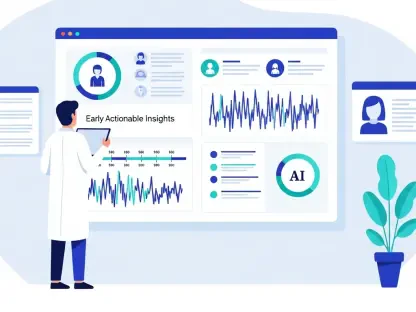The healthcare industry is undergoing a profound digital transformation aimed at enhancing patient outcomes, boosting operational efficiency, and staying aligned with evolving technological trends. Central to this transformation is the modernization of healthcare technology, a daunting task made more complex by budget constraints, especially for hospitals. Investing money to save money is a significant challenge for budget-restricted healthcare technology leaders, and this issue is further exacerbated in the context of hospital mergers and acquisitions, where different hospitals typically utilize disparate systems.
The Challenge of Budget Constraints
One of the most prominent consequences of budget constraints is that system integrations, which ideally should take six months, can drag on for five years. Chief Information Officers (CIOs) are often forced to stretch inadequate systems to meet the needs of multi-tenant, multi-location facilities. Decades-old systems and solutions cannot evolve to support modern infrastructures adequately. For instance, traditional hospital Electronic Health Record (EHR) systems, built on inflexible architectures, have limited support for external data, poor interoperability, and view data ownership as belonging to the provider rather than the individual.
The exponential growth of personal health data from IoT devices, advancements in healthcare research through AI, and hospital consolidations necessitate modernization. Future EHR systems need to be flexible, portable, and secure. Unfortunately, adopting such modern systems is often not feasible for most hospitals due to the high costs involved. Therefore, the challenge lies in prioritizing the evolution of systems to operate like modern data centers within a budget. Hospitals must find ways to innovate within financial limitations, ensuring that the infrastructure evolves without compromising on essential services or patient care.
The Importance of Security
Security is a critical aspect of healthcare technology modernization due to the sensitive nature of patient data and the high-stakes healthcare environment. The industry is a prime target for cybercriminals, with the healthcare sector experiencing the highest average data breach cost of any industry in 2022, at $10.1 million per incident. Most hospitals lack the advanced security mechanisms necessary to combat today’s cyber threats, making security a priority for every aspect of hospital operations, not just the data center. Healthcare organizations need to consider multiple attack vectors and understand that the threat landscape is continually evolving.
Adopting a Zero Trust security framework, which limits the number of trusted zones by not trusting anyone anywhere by default, is a vital goal for hospitals, even though it may be unattainable. To mitigate exposure to cyber risks, healthcare organizations must adopt a comprehensive security strategy that integrates both technological and human elements. This strategy starts by creating three critical frameworks: Zero Trust, Data Protection/Ransomware, and Data Governance/Compliance, significantly altering how data is accessed, manipulated, and how users and access are verified. These frameworks provide the foundation for a robust security posture, ensuring that all layers of healthcare operations are fortified against potential threats.
Comprehensive Security Strategies
Implementing advanced monitoring mechanisms can help safeguard sensitive data, identify anomalous data manipulation, and secure against unauthorized access attempts. However, beyond technological measures, healthcare organizations must prioritize security education and employee awareness. Cybersecurity training programs empower staff to recognize and respond to threats like phishing and social engineering attacks. By fostering a culture of security awareness, healthcare organizations can significantly reduce the risk of data breaches and other security incidents.
Effective data management and governance underpin the success of healthcare technology modernization. As healthcare organizations collect and process increasingly large volumes of patient data, establishing a robust data governance framework is crucial. Without defined data governance policies, building a successful security platform for a digital hospital is impossible. These policies should address data privacy, security, and compliance requirements, ensuring that sensitive information is handled per relevant regulations such as HIPAA and GDPR. Proper governance ensures that data remains a valuable asset while mitigating the risks associated with poor management practices.
Data Governance and Protection
Healthcare organizations should consider the importance of data locality, ensuring patient data is stored and processed within the appropriate geographic boundaries to comply with data sovereignty laws and mitigate the risks of cross-border data transfers. The best guidance typically involves storing data on platforms with well-designed cybersecurity and data validation capabilities. Ransomware protection and immutable snapshots are two critical capabilities for data cyber protection. It is also vital to create a cohesive plan to classify and protect data based on its risk and value as defined by your data governance framework.
By prioritizing data governance, protection, and locality, healthcare organizations can build trust with patients, demonstrate compliance with regulatory requirements, and reduce the risk of data breaches and other security incidents. Once data management processes are well-defined, the adoption of AI-based solutions becomes the next key aspect of healthcare technology modernization. Data protection measures ensure the integrity of sensitive information while providing a foundation for advanced technological adoption, such as AI.
Leveraging AI in Healthcare
Artificial intelligence (AI) has the potential to transform various aspects of healthcare, from clinical decision-making to operational efficiency. However, AI initiatives are only as good as the data that feeds them. Healthcare providers can leverage AI without needing to rearchitect the entire data center. AI is increasingly being incorporated into current technologies, enhancing their capabilities and providing increased value to organizations without necessitating disruptive infrastructure changes.
AI-enabled solutions offer insightful analysis, improved efficiencies, and advanced technologies to protect digital transformation efforts. For example, AI-driven automation can elevate monitoring and decision-making to sophisticated levels, assisting in data protection frameworks based on predefined policies. Identity management tools, augmented by AI, ensure that users access only the content relevant to them and flag any suspicious activity. As technology becomes more integrated and intelligent, the efficiency and accuracy of healthcare operations are likely to see significant improvements.
Enhancing Threat Detection with AI
The healthcare industry is undergoing significant digital transformation to improve patient outcomes, increase operational efficiency, and keep pace with evolving technology. At the core of this transformation is the modernization of healthcare technology—a task complicated by tight budgets, especially for hospitals. It’s a paradox, investing money upfront to save money in the long run, and this challenge is further magnified during hospital mergers and acquisitions. These mergers often bring together hospitals that use different systems, adding another layer of complexity to an already challenging process. For healthcare technology leaders working within restricted budgets, it can be particularly difficult to justify and secure the necessary investments in technology upgrades. As hospitals integrate and align disparate systems, they must balance cost-saving measures with the need to adopt cutting-edge technology. This delicate balance is essential for achieving the ultimate goal of enhanced patient care, improved efficiency, and staying current with technological advancements.









